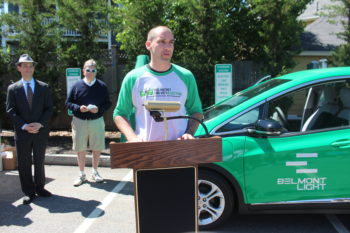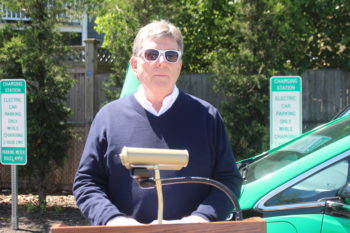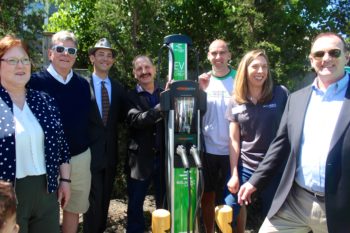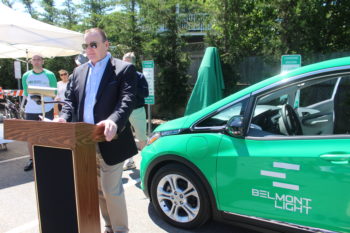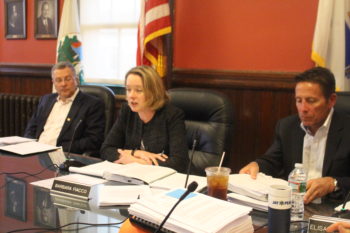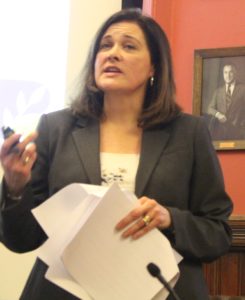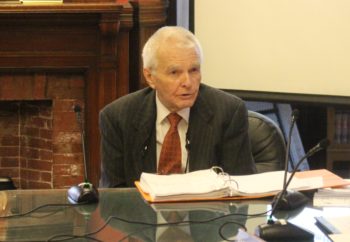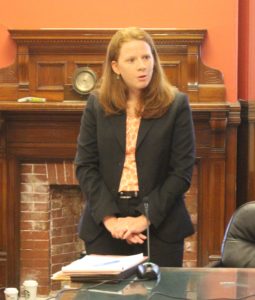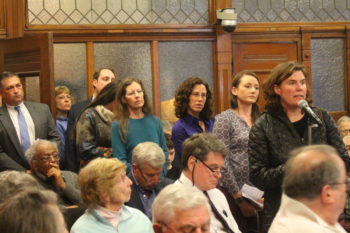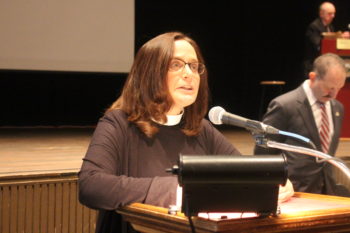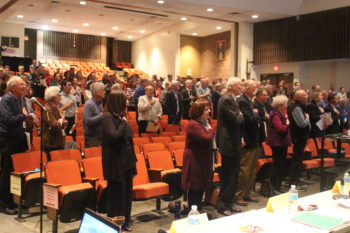Photo: Mike Widmer (on stage) with Town Meeting member Jack Weis, Pct. 1
Welcome to the second session of the annual Belmont Town Meeting held tonight, Monday, June 5 at Belmont High School.
The meeting, known as Segment B, will involve all things financial: the town and school budgets, capital expenditures, transfers and all the other spare change the town takes in and spends.
The Town Moderator, Mike Widmer, said he would attempt to finish this final home stretch of this year’s meeting in two nights; tonight and Wednesday, June 7. He has asked Town Meeting Members to keep their questions to the motion and speeches short.
Tonight, the order of motions will be:
- Appropriation of $1.4 million in capital expenses.
- Budget appropriation and transfer balances to fund the fiscal year 2018 budget.
- Borrowing appropriations
- Authorization of revolving funds and funding stabilization funds.
7 p.m.: It’s cool inside Belmont High School as its a rainy, dreary late evening – perfect weather to talk about town finances.
7:08 p.m.: Mike Widmer calls the meeting in order. Right on (Belmont) time. He asks members to be concise and brief so it can be finished in two nights.
7:14 p.m.: State Rep. Dave Rogers gives a report on state government – legislation and the budget. He said the town schools got a big bump in state aid up to $7 million, up 10 percent. Nice earmarks for the town of a total of $150,000. But there is a budget crunch in the state, with MassHealth (the state’s Medicaid program) takes up 40 percent of the budget. A partial solution: make employers who don’t give their employees health care must pay the state tax. Rogers is also a co-chair of Marijuana committee – dude! He also is the sponsor of the Pregnant Workers Fairness Act – which got universal support – and is pushing a paid family and medical leave insurance program, a safe communities act and a few environmental legislation including energy efficiency funds generated by municipal light plants, and a bill to protect bees.
7:25 p.m.: The selectmen are now talking about accomplishments and goals.
Accomplishments: selling the municipal parking lot in Cushing Square, establishing a high school building committee, the Trapelo/Belmont corridor project, the Belmont Center reconstruction project, the completion of the construction and sale of the new electrical substation and more.
Goals: to implement a strategic planning process and coordinate goal setting session with the board of selectmen and department heads, hire a new town administrator, develop recommendations for providing vocational education to Belmont students, develop a capital plan for municipal buildings, a public/private partnership to build a new skating rink and a new garbage contract.
7:38 p.m.: Anne Marie Mahoney gives a report about the new (created in Feb.) Major Capital Project Working Group, starting with a quip about adding music from the 60s to the presentation such as “Gimme Shelter” and “We Need to Get Out of This Place.” The committee was formed to finally create a comprehensive “sound” plan for the four outstanding capital projects in town: the police station, the DPW, the library and Belmont High School. It is trying to break the quarter century logjam to choice a one-at-a-time order for projects, recommend uses for the incinerator site and present a sequence and finance plan for each project. “All town employees deserved a basic, safe and decent place to work.” We will be back before you in the fall (at a Special Town Meeting) with a plan or die trying.” Mahoney hopes to be back with “Good Vibrations” or “I’m a Believer.”
7:48 p.m.: Mahoney is back with the Capital Budget Committee’s recommendations. It sounded from Mahoney’s introduction that it was a battle to get this budget allocation done. $1.36 million was allocated from the Selectmen to the CBC. There is $2.4 million for roads and sidewalks. Good news this year: no “big” ticket allocation so most of the money goes to maintenance. This year there was a balance the need to repair with the need to replace buildings – the library is the best example. Mahoney goes into the weeds of each line item. Read specific funding here. Mahoney also noted that the CBC will be coming back in the fall with possible requests for modular classrooms, expenditures for town buildings and other items.
8:03 p.m.: Mahoney is reading each capital expenditures – some of the larger requests: $114,000 for fire staff vehicle 1 and 2; $200,000 for cameras for town-wide security, $45,000 to replace a truck for the DPW; $40,000 for new Chromebooks for the schools to take taxes; and $191,000 for building envelope “repairs.”
8:08 p.m.: Now debate on the motion. Only two quick questions. The motion is approved by a voice vote. Good job, Ann Marie.
8:09 p.m.: Glenn Clancy, the town’s director of the Office of Community Development, presents the road paving budget. The program was launched in 1996, there are 75 miles of roads, and the program has repaired 42 miles. The balance each year to fix roads is about $1.8 million. The roads are evaluated, the last full evaluation was in 2007 and a partial evaluation in 2014 of the worst roads. The selection process – which roads are restored – “couldn’t be any simpler – the worst roads get repaired first.” Utility work happens first before a reconstruction occurs “which will make the road even worse!” “But there is a method to the madness,” said Clancy. Sidewalk construction is set aside on school walking routes.
8:19 p.m.: The motion is open for debate. No questions. The $1.9 million for road repair is approved on a voice vote.
8:21 p.m.: Article 12, $7.5 million appropriated from the Water Enterprise Fund that will be funded from a transfer from water retained earnings and water revenues. Approved without debate.
The second part of the article, $9.3 million for the Sewer and Stormwater Enterprise Fund, is presented. Fred Paulsen, Pct. 1, asks Clancy about Belmont’s agreement with the Mass EPA to reduce pollution coming from Belmont’s sewers into the Mystic River watershed and if there should be some priority how the town mitigate the effects. Clancy said the town would follow the agreement and the town will get the job done in the five years that it has to meet the state’s guideline.
The motion passes on a voice vote unanimously.
8:29 p.m.: Article 14, to use $535,000 from the state to use to repair roads. Adopted unanimously.
8:30 p.m.: Article 23 is to “de-authorize” or rescind the unused borrowing authority of $27.6 million authorized by a special town meeting in 2012 to build the electrical substation and transmission line project. Jim Palmer, Belmont Light’s general manager, speaks about the project and its sale to Eversource which saves the town a ton of money. Sue Bass of Pct. 3 asks Palmer when will the three current substations be decommissioned. Palmer said the earliest those substations will be closing in 2022. “I wish it were sooner, but that is our plan.” Approved by a voice vote.
8:42 p.m.: Article 24: Another rescinding of borrowing authority for $255,000 for the purchase of radio transmission equipment. Approved. Article 25 is also repealing borrowing authority of $350 for a fire alarm system at the high school. You can guess how the vote went.
8:45 p.m.: Article 11: Salaries for elected officials. Three increases in salaries – with the moderator seeing a more than 100 percent increase – from $200 to $450. Paul Roberts, Pct. 8, asked if the town can see what other municipalities are providing their elected officials. There is some discussion of paying school committee members with a salary as they spend a great number of hours on the town’s schools for no pay. Article passes.
8:51 p.m.: Up now is Article 17 the yearly authorization for the eight revolving funds. No debate and it passes.
8:52 p.m.: Article 16, which will appropriate and transfer $354,314 from free cash and to appropriate and transfer a total of $30,392 several enterprise funds to fund the Other Post Employment Benefits (OPEB) – which are health care costs to town retirees – Stabilization Fund. Passes with little discussion.
9 p.m.: No further votes will take part tonight. The last piece of business tonight is to hear from the Warrant Committee Chair Roy Epstein who is explaining the town budget; how it was developed, what it’s made up of and how it is spent. Read along with the Warrant Committee Report!
The town budget for fiscal 2018 will be $110.08 million, an increase of 3.5 percent, with schools up to $52.97 million up 5.7 percent (“because enrollment is exploding”) with the Town side at $38.55 million, an increase of 4.3 percent. Fixed costs up 3.5 percent to $17.2 million.
There is about $7 million in free cash (the town’s piggy bank) but will be drawn down to $4.4 million.
Beyond fiscal 2018 is shaky: while the town can expect growth of 3.5 percent but school expenditures will put a lot of pressure on spending priorities. “It will be a challenge” over the next five years, said Epstein.
9:17 p.m.: And that’s it! We are out early. See you Wednesday.
